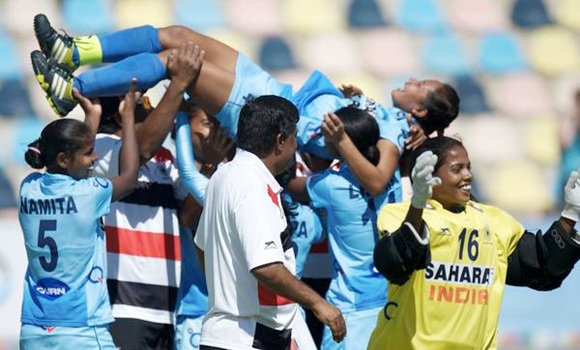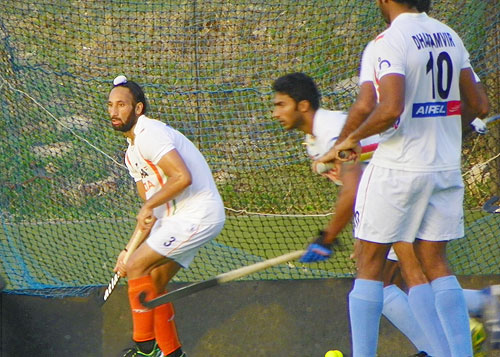Photographs: Courtesy: Hero Hockey India League
The launch of a much-hyped professional league on the lines of IPL, the rise and fall of colts, an overhaul of the coaching set-up and women overshadowing their male counterparts -- 2013 was an eventful roller-coaster ride for Indian hockey.
The best thing to happen for Indian hockey players this year was the introduction of the professional Hockey India League (HIL).
The HIL, conceptualised on the lines of cricket's million dollar baby IPL, turned out to be a big success.
The event not only gave uncapped Indian players the opportunity to rub shoulders with the best in the world, but also enabled every player, be it Indian or international, to earn never-before-heard pay cheques for just 30 days of hockey.
The league was an instant hit as it gave Indian hockey a new star in Mandeep Singh, who represented Ranchi Rhinos, the champions of the inaugural edition.
Eventful year for Indian hockey as women outperform men
Image: Team India celebrate their victoryPhotographs: Courtesy: Hockey India/Facebook
On performance front, it was the junior women's team that stole the limelight by bagging a historic bronze medal in the World Cup held at Monchengladbach, Germany.
The junior eves' historic medal, in fact, remained the most striking image of 2013 for Indian hockey. Led by Sushila Chanu, the girls won their first-ever World Cup medal by beating England in the third-place playoff via penalty shoot-out.
But for this, the on-field success of Indian hockey in 2013 was limited to the subcontinent.
The senior eves also did well for themselves winning a bronze in the Asia Cup and a silver in the Asian Champions Trophy to make it a profitable year for Indian women's hockey.
Just like the girls, the junior boys started the year on a promising note by clinching the Sultan of Johor Cup title in Malaysia, which gave India the self belief that they can win the Junior World Cup at home.
But Manpreet Singh and his men were in for a rude shock as they failed to live up to the expectations and crashed out in the pool stages, eventually finishing a disappointing 10th in the 16-team event.
The senior men's team too witnessed a bright start to the year as the Sardar Singh-led side registered a six-match unbeaten run in the FIH World League Round 2 at the Major Dhyan Chand Stadium here to secure a berth in the league's semi-finals in Rotterdam that doubled up as a World Cup qualifier.
But the past masters of the game failed to secure a direct entry in next year's World Cup by finishing outside the top three position at Rotterdam.
After missing a direct entry at the World Cup through Rotterdam, India's best chance to qualify for the quadrennial event was by becoming the continental champions. But that didn't happen as Korea defeated Sardar and Co in the final to win the Asia Cup in Ipoh, Malaysia.
However, Pakistan's defeat to Korea in the semifinal of the Asia Cup virtually assured India's ticket to The Hague, Netherlands, which was confirmed after Australia won the Oceania Cup.
Eventful year for Indian hockey as women outperform men
Image: Indian players at a training sessionPhotographs: Laxmi Negi/ Rediff.com
India's participation in next year's showpiece event was sealed following the completion of the men's and women's Oceania Cup continental championships in Stratford, New Zealand in November.
Like all the continental championships, the big prize on offer for the winners of the men's and women's Oceania Cup tournaments was direct qualification to the World Cup.
However, with both the Australian teams already achieving World Cup qualification thanks to strong performances in the Hockey World League semifinals, the door was subsequently opened to the teams that finished outside the top three at the HWL Semi-Finals that had not yet qualified for the World Cup.
The Indian men's sixth place finish at the HWL Semi-final in Rotterdam has proven to be enough for their participation.
But it turned out to be black year for neighbours Pakistan as they missed the bus to the World Cup, for the first time since the introduction of the event in 1971.
Barring the silver medal at the Asia Cup, there was nothing much to show for the big boys of Indian hockey.
India finished in identical fifth positions in this year's Sultan Azlan Shah Cup and the Asian Champions Trophy, where the national federation (Hockey India) had sent a junior team keeping in mind the World Cup.
Eventful year for Indian hockey as women outperform men
Photographs: Courtesy: Hockey India/Facebook
The last 12 months also witnessed Hockey India making quite a few changes in the game's administrative as well coaching set-up to bring in professionalism.
With noble intentions of bringing back the glorious days of Indian hockey, HI roped in legendary Dutch coach Roelant Oltmans as the High Performance Director.
The national federation also appointed a specialized goalkeeping coach in Dave Staniforth of South Africa to hone the skills of custodians, besides giving the junior men team's reigns to Gregg Clark, the coach of inaugural HIL champions Ranchi Rhinos.
But India's failure at the HWL Semi-finals marked the end of senior men's team chief coach Michael Nobbs' India sojourn as he quit the job, citing illness just after returning from Rotterdam.
After extensive search, HI appointed another Australian Terry Walsh as Nobbs' successor towards the end of the year.
To strengthen the senior team's support base, former India coaches MK Kaushik and Vasudev Baskaran were added as Walsh's assistant.
Among other notable steps taken by the national federation in 2013 was the restructuring of the selection committee.
In order to bring in more accountability and fresh ideas, HI appointed a relatively young nine-member selection committee under Olympian BP Govinda's chairmanship.
The new-look selection committee had former India captains Gagan Ajit Singh and Arjun Halappa besides Syed Ali, RP Singh, Savitri Purty, Mamta Kharab, Surinder Kaur and Saba Anjum.
India were also in for a pleasant surprise towards the end of the year when they managed to successfully bid for the hosting rights of 2018 World Cup.





Comment
article